To make the best respiratory health tea, you should consider herbs like mullein, peppermint, and eucalyptus. Mullein is great for relieving coughs and clearing mucus, while peppermint opens airways and soothes congestion with its cooling effects. Eucalyptus not only reduces inflammation but also helps fight respiratory infections. You might also want to add thyme for its antiseptic properties, ginger for its anti-inflammatory benefits, and licorice root to soothe irritation. Experiment with these herbs to find your perfect blend that supports your breathing and boosts your immune system. You'll discover even more helpful combinations and tips ahead!
Benefits of Respiratory Health Tea
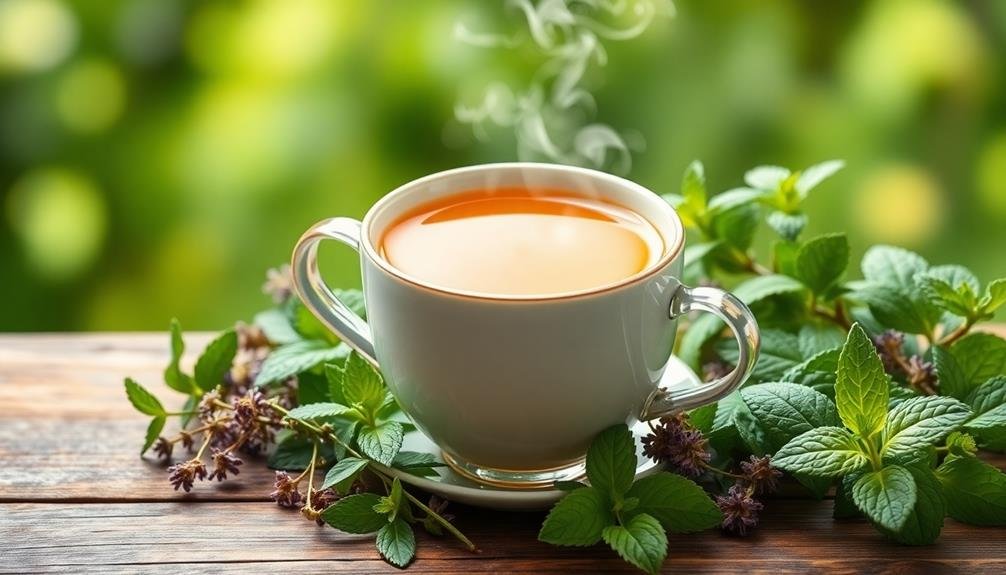
Respiratory health tea offers a soothing blend of benefits that can enhance your overall well-being. When you sip on this tea, you're not just enjoying a warm beverage; you're also supporting your respiratory system. The natural ingredients work together to help clear your airways, making it easier to breathe.
You might notice that it promotes relaxation, reducing stress and tension that can contribute to respiratory issues. Drinking this tea regularly can also boost your immune system, helping you fend off colds and other respiratory infections.
It's particularly beneficial during cold and flu season, as it can help soothe a sore throat and alleviate coughs. Additionally, the warmth of the tea can provide immediate relief, easing discomfort and allowing you to breathe more freely.
Incorporating respiratory health tea into your daily routine could lead to better sleep, as it helps you unwind and reduces nighttime coughing.
All in all, this tea not only tastes good but also serves as a gentle ally in maintaining your respiratory health. So next time you reach for a drink, consider brewing a cup of respiratory health tea for its myriad benefits!
Key Herbs for Respiratory Support
When looking for natural ways to support your lungs and airways, certain herbs can make a significant difference.
These herbs have been used for centuries to promote respiratory health and can be easily incorporated into your daily routine.
Here's a quick rundown of key herbs you might consider:
- Mullein: Known for its soothing properties, mullein can help relieve coughs and clear mucus from the respiratory tract.
- Peppermint: This invigorating herb contains menthol, which can help open airways and ease congestion, making it easier to breathe.
- Eucalyptus: Often used in steam therapy, eucalyptus has anti-inflammatory properties that can help reduce irritation in the airways.
- Licorice Root: A natural expectorant, licorice root can soothe the throat and help clear phlegm, providing relief from respiratory discomfort.
Incorporating these herbs into a tea can't only be delicious but also beneficial for your respiratory health.
Keep an eye out for dried blends or create your own to enjoy the rich flavors and potential health benefits.
Thyme and Its Properties
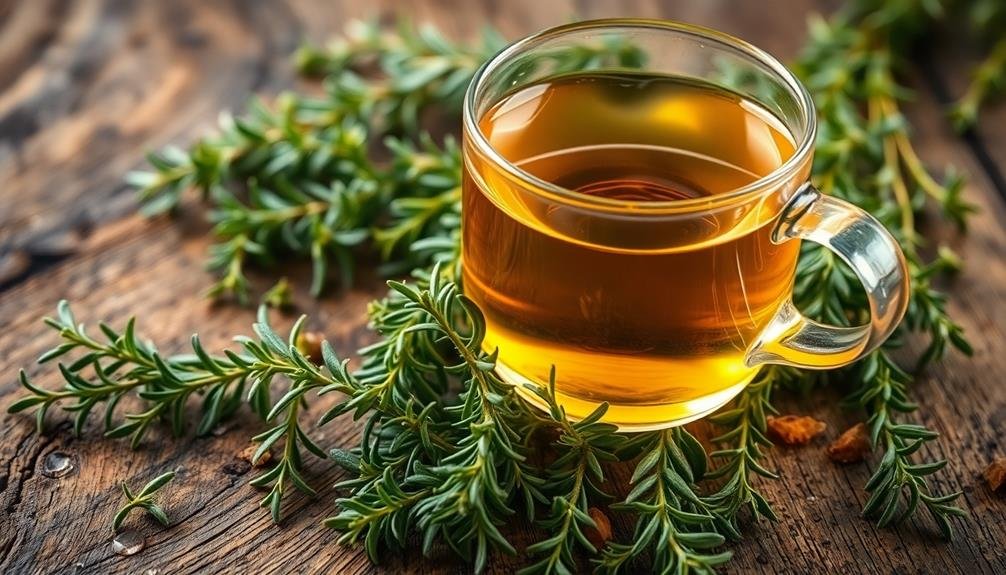
Thyme is another powerful herb that's often overlooked but offers remarkable benefits for respiratory health. This aromatic herb, commonly found in kitchens, contains thymol, a compound known for its antiseptic and antimicrobial properties. When you brew thyme tea, you're not just enjoying a flavorful beverage; you're also supporting your respiratory system.
Thyme can help relieve coughs and congestion, making it easier for you to breathe. Its expectorant qualities encourage the expulsion of mucus, clearing your airways and providing relief from bronchial irritation.
Plus, the warm, soothing nature of thyme tea can ease throat discomfort that often accompanies respiratory issues.
If you're feeling under the weather, adding thyme to your tea can enhance your immune response. You can simply steep fresh or dried thyme in hot water for a few minutes, adding honey or lemon for extra flavor. This simple remedy can be a comforting way to nurture your respiratory health.
Experiment with thyme in your tea blends, and you'll discover how this humble herb can elevate your wellness routine. Embrace thyme as a go-to ingredient in your herbal arsenal for respiratory support!
Eucalyptus Leaves for Breathing
Inhaling the invigorating aroma of eucalyptus leaves can instantly soothe your breathing and clear your airways. Known for their medicinal properties, eucalyptus leaves contain compounds that help reduce inflammation and promote respiratory health.
When you brew a tea with these leaves, you can experience several benefits that enhance your overall well-being.
- Anti-inflammatory Effects: Eucalyptus leaves can help reduce swelling in the respiratory tract, making it easier for you to breathe.
- Expectorant Properties: The leaves may aid in loosening mucus, allowing for easier expulsion and relief from congestion.
- Antimicrobial Action: The natural compounds found in eucalyptus can help fight respiratory infections, promoting a healthier airway.
- Relaxation: The calming scent of eucalyptus not only supports breathing but also helps to relieve stress and anxiety, allowing you to feel more at ease.
Incorporating eucalyptus leaves into your daily routine can be an effective way to support your respiratory health.
Just a warm cup of eucalyptus tea can transform your breathing experience and bring you the comfort you need.
Peppermint's Cooling Effects
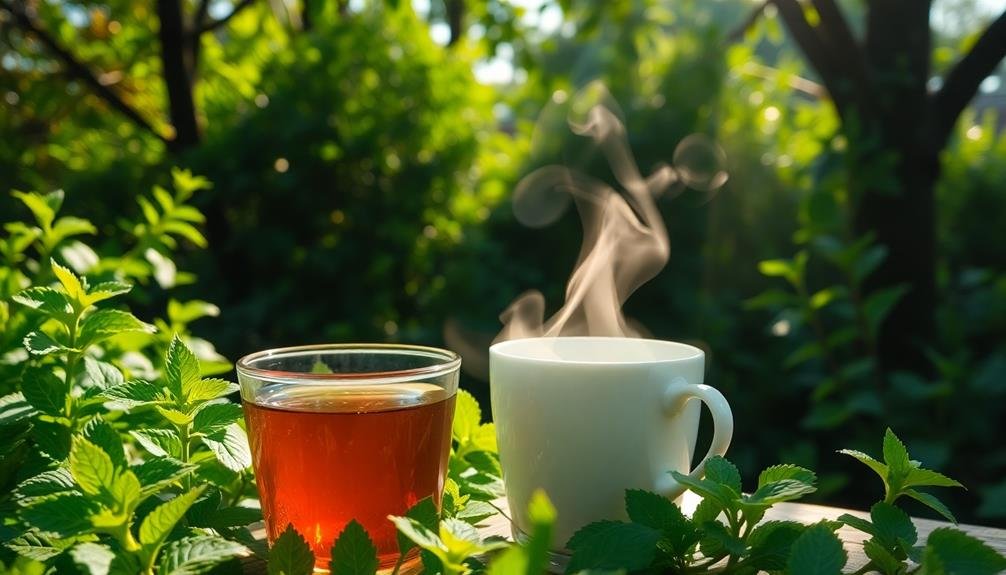
Peppermint's cooling effects can provide soothing relief for your respiratory system, making it easier to breathe.
Not only does it help clear your airways, but its invigorating flavor adds a delightful twist to your herbal tea.
You'll find that this aromatic herb can enhance both your experience and your health.
Soothing Respiratory Benefits
When you sip on peppermint tea, you're not just enjoying a flavorful experience; you're also tapping into its remarkable cooling effects that can soothe your respiratory system.
The menthol in peppermint acts as a natural decongestant, helping to clear your airways and ease breathing. This herbal remedy offers several soothing benefits that can enhance your respiratory health.
Here are a few ways peppermint tea can help you:
- Eases Congestion: The cooling properties of menthol can help relieve nasal and chest congestion, making it easier for you to breathe.
- Reduces Inflammation: Peppermint possesses anti-inflammatory properties that can calm irritated airways and reduce symptoms associated with respiratory conditions.
- Alleviates Coughing: When you drink peppermint tea, it can help soothe a persistent cough by relaxing the throat muscles and reducing irritation.
- Enhances Overall Comfort: The comforting warmth of the tea, combined with menthol's cooling effects, can create a sense of relaxation, promoting better overall respiratory health.
Aromatic Flavor Profile
The invigorating aroma of peppermint tea not only tantalizes your taste buds but also delivers a unique cooling sensation that revitalizes your senses. When you take that first sip, you'll immediately notice how the revitalizing flavor dances on your palate, awakening your taste buds. This cooling effect isn't just pleasant; it's also soothing, especially when you're feeling congested or under the weather.
The menthol in peppermint acts as a natural decongestant, making it easier for you to breathe deeply. As you enjoy your tea, the aromatic compounds help clear your nasal passages and open up your airways. You might even find that the crisp, minty flavor lingers, providing a satisfying aftertaste that keeps you reaching for more.
Whether it's the middle of a hot summer day or a chilly winter evening, peppermint tea offers a delightful experience. It's versatile, too—blend it with other herbs like eucalyptus or chamomile for additional benefits and flavors.
Ginger for Inflammation Relief
Ginger's powerful anti-inflammatory properties make it a go-to herb for those seeking relief from respiratory issues. When you brew ginger tea, you're not just enjoying a flavorful drink; you're also harnessing its numerous benefits for your respiratory health.
Here are four reasons why ginger should be part of your tea routine:
- Reduces Airway Inflammation: Ginger can help calm the inflammation in your airways, making it easier to breathe.
- Enhances Mucus Clearance: Drinking ginger tea can aid in thinning mucus, promoting easier expulsion and clearing up congestion.
- Boosts Immune Function: With its rich antioxidant content, ginger supports your immune system, helping you fend off respiratory infections.
- Soothes Coughs: The natural compounds in ginger have soothing properties that can help alleviate persistent coughs.
Incorporating ginger into your respiratory health tea not only makes it tastier but also provides essential relief that can greatly improve your comfort.
Licorice Root Benefits
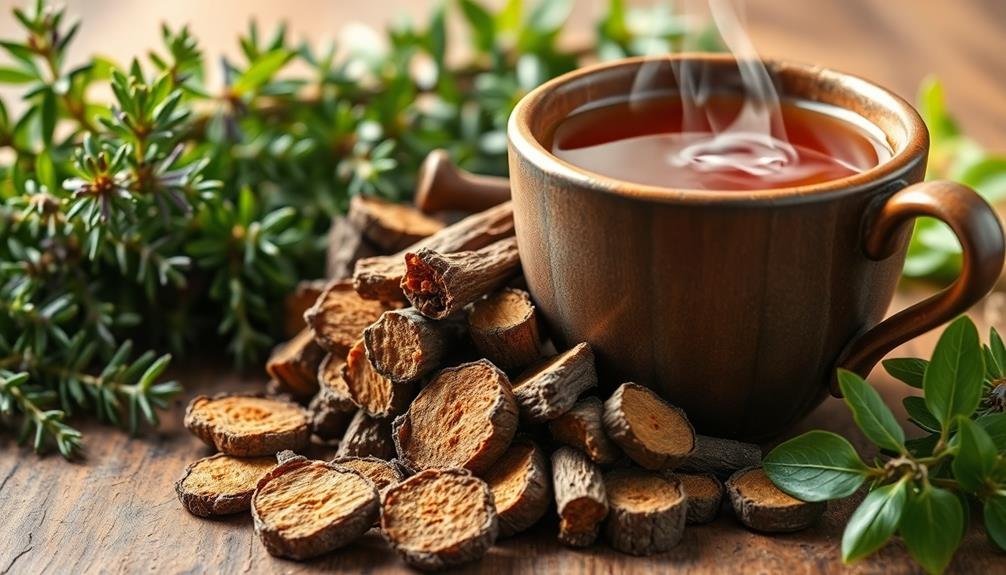
Licorice root offers some impressive benefits for your respiratory health.
It soothes coughs and reduces inflammation, making it a great addition to your herbal tea.
If you're looking for natural ways to support your breathing, licorice root might be just what you need.
Soothing Cough Relief
When you're battling a persistent cough, turning to licorice root can really ease your discomfort. This powerful herb has been used for centuries to help soothe throat irritation and quiet coughing fits. Its natural sweetness makes it a pleasant addition to your tea, and its benefits go beyond just taste.
Here are four key reasons why licorice root is a great choice for cough relief:
- Expectorant Properties: Licorice root helps loosen mucus, making it easier to expel. This can clear your airways and alleviate coughing.
- Soothing Effect: The herb coats the throat, providing a soothing barrier that reduces irritation. This can be especially comforting during a dry cough.
- Antiviral Qualities: Licorice root has compounds that may help combat viruses, potentially shortening the duration of your cough if it's caused by an infection.
- Boosts Immune Function: By supporting your immune system, licorice root can help your body fight off the underlying cause of your cough more effectively.
Incorporating licorice root into your tea can be a delicious and beneficial way to find relief from that nagging cough.
Anti-Inflammatory Properties
Harnessing the anti-inflammatory properties of licorice root can greatly benefit your respiratory health. This powerful herb contains glycyrrhizin, which helps reduce inflammation in your airways, making it easier for you to breathe.
When you're dealing with respiratory issues, inflammation can exacerbate symptoms, leading to discomfort and difficulty in breathing. Licorice root acts as a natural anti-inflammatory, soothing irritated tissues and promoting overall respiratory wellness.
Moreover, licorice root supports your immune system, helping your body fend off infections that can lead to respiratory problems. By incorporating licorice root into your tea, you're not just alleviating current symptoms; you're also working to prevent future issues.
Consider brewing a warm cup of licorice root tea when you feel a cough or sore throat coming on.
It's essential to note that while licorice root is beneficial, moderation is key. Consuming it in excessive amounts can lead to unwanted side effects like elevated blood pressure.
Always consult with a healthcare professional before making significant changes to your herbal regimen. With mindful use, licorice root can be a valuable ally for your respiratory health.
Mullein as a Soothing Herb
Mullein offers a remarkable soothing quality that can greatly benefit respiratory health. When you incorporate this herb into your tea, you're tapping into a long history of natural remedies aimed at alleviating respiratory discomfort.
Here's how mullein can help you:
- Expectorant Properties: Mullein helps loosen mucus, making it easier for you to expel from your lungs. This can be particularly beneficial if you're dealing with congestion.
- Anti-inflammatory Effects: By reducing inflammation in the respiratory tract, mullein can alleviate irritation and promote easier breathing.
- Soothing Effects: The soft, velvety leaves of mullein can provide a calming effect, helping to ease a sore throat and minimize coughing.
- Supports Overall Lung Health: Regularly consuming mullein tea can contribute to the overall health of your lungs, acting as a gentle tonic for respiratory function.
Oregano's Immune Boosting Qualities
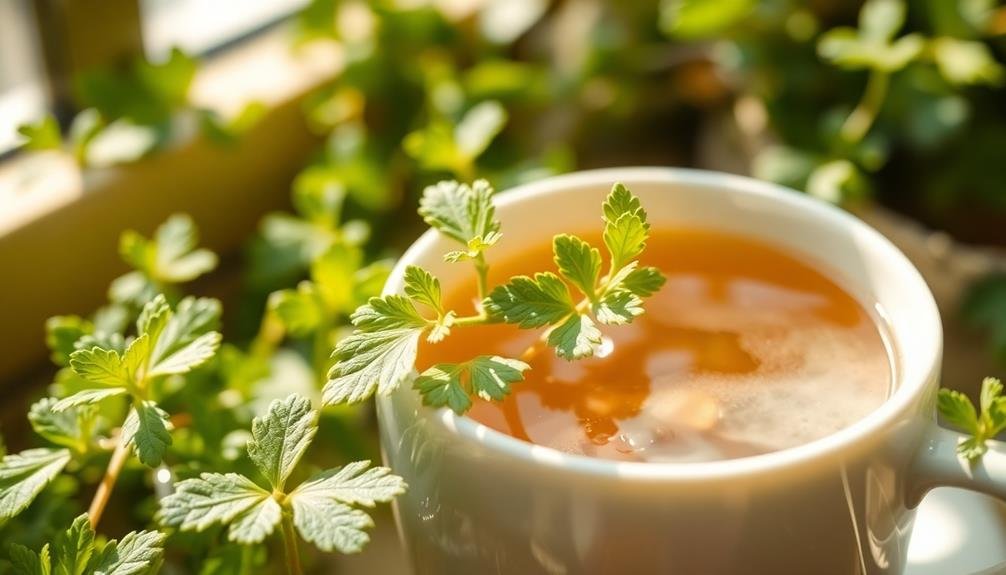
Oregano's immune-boosting qualities can greatly enhance your respiratory health by providing essential support to your body's defenses. This powerful herb is rich in antioxidants, which help neutralize harmful free radicals and protect your cells from damage.
When you brew oregano tea, you're not just enjoying a flavorful beverage; you're also giving your immune system a much-needed boost.
One of the key components of oregano is carvacrol, known for its antimicrobial properties. This compound can help combat bacteria and viruses that might compromise your respiratory health.
By incorporating oregano into your tea, you're actively supporting your body in fighting off infections and promoting overall wellness.
Additionally, oregano contains vitamins A, C, and E, which are essential for maintaining a strong immune system.
These vitamins help your body develop a robust defense against respiratory issues, making oregano a fantastic choice for those looking to improve their health.
Chamomile for Relaxation
Chamomile is a popular herb known for its soothing properties, making it a perfect choice for relaxation. When you brew a cup of chamomile tea, you're not just indulging in a warm beverage; you're also inviting a wave of calmness into your day. This gentle herb has been used for centuries to help with stress and anxiety.
Here are some benefits of chamomile that can enhance your relaxation routine:
- Sleep Aid: Chamomile is often used as a natural remedy for insomnia, helping you drift off into a peaceful slumber.
- Digestive Support: If you're feeling anxious or stressed, chamomile can help soothe your digestive system, alleviating discomfort.
- Mood Booster: The mild sedative effects of chamomile can elevate your mood, making you feel more at ease.
- Anti-inflammatory Properties: Drinking chamomile tea can help reduce inflammation in the body, promoting overall health.
Incorporating chamomile into your daily routine can provide a much-needed respite from the hustle and bustle of life.
Blending Herbs for Tea
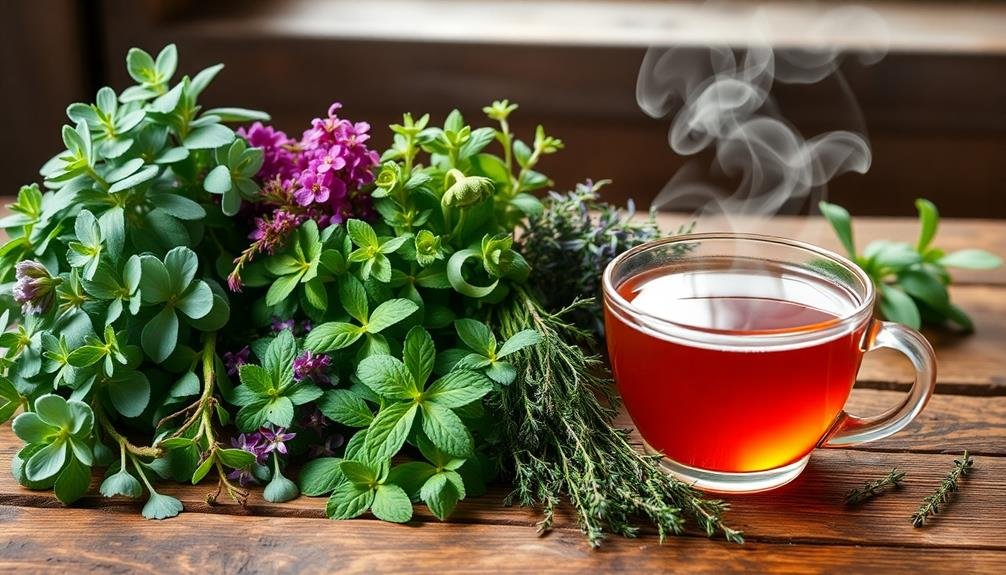
When you're blending herbs for respiratory health tea, selecting the right ingredients is essential.
You'll want to choose herbs known for their benefits, like eucalyptus or peppermint, to create a soothing brew.
Understanding brewing techniques can also enhance the flavor and effectiveness of your tea, making each cup a step towards better respiratory health.
Selecting Respiratory Herbs
Selecting the right herbs for respiratory health can make a significant difference in your tea's effectiveness. When you're blending herbs, consider a few key factors to guarantee you create a powerful and soothing blend.
- Antimicrobial properties: Choose herbs like thyme and oregano, which can help fight off infections and support lung health.
- Expectorants: Incorporate ingredients like peppermint and eucalyptus, as they can help clear mucus and ease breathing.
- Soothing agents: Look for herbs like marshmallow root or slippery elm, known for their ability to coat and soothe irritated throats.
- Anti-inflammatory benefits: Include herbs such as ginger and turmeric, which can reduce inflammation in the respiratory system.
Brewing Techniques Explained
Brewing herbal tea for respiratory health is often a straightforward process that can yield delicious and effective results. Start by selecting your herbs based on their respiratory benefits, such as thyme, eucalyptus, or peppermint. Use dried herbs for a stronger flavor, or fresh herbs for a lighter taste.
Next, measure about one tablespoon of dried herbs or two tablespoons of fresh herbs per cup of water. Bring your water to a gentle boil, then remove it from heat. Add your herbs to the water and cover the pot, allowing the mixture to steep for 5 to 10 minutes. This steeping time helps extract the essential oils and beneficial compounds from the herbs.
Once the tea has steeped, strain out the herbs using a fine mesh strainer or cheesecloth. You can sweeten your tea with honey or lemon if desired, both of which also provide respiratory benefits.
Enjoy your tea warm, or let it cool and serve it over ice for a revitalizing drink. Experiment with blending different herbs to find a combination that suits your taste while maximizing respiratory health benefits. Happy brewing!
Brewing the Perfect Tea
To achieve the best flavor and health benefits from your respiratory health tea, pay attention to the brewing process. The right technique can enhance the potency of the herbs you choose, making your tea more effective and enjoyable. Here are some key steps to follow:
- Choose Fresh Herbs: Whether you're using dried or fresh herbs, freshness matters. Dried herbs should be stored properly to maintain their potency, while fresh herbs should be used within a week of purchase.
- Measure Correctly: A general guideline is to use one teaspoon of dried herbs or one tablespoon of fresh herbs per cup of water. Adjust based on your taste preferences and the strength of the herbs.
- Water Temperature: Different herbs require specific water temperatures. For example, delicate herbs may need water around 160°F, while sturdier herbs can handle boiling water at 212°F.
- Steeping Time: Steep your tea for about 5 to 15 minutes, depending on the herb. Taste it periodically to find the right balance of flavor and strength.
Tips for Herbal Tea Storage
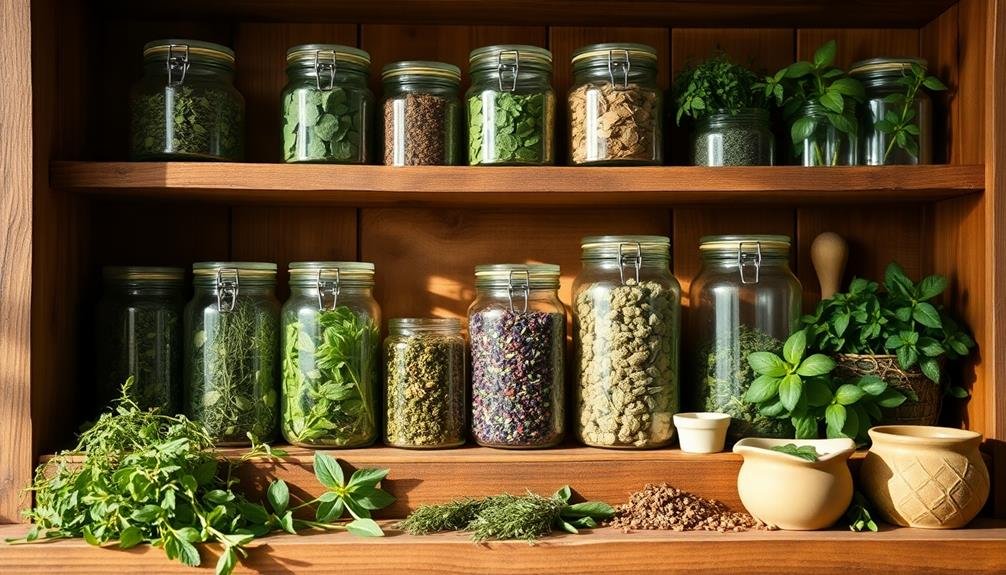
Properly storing your herbal tea can greatly impact its flavor and potency. To keep your tea fresh, start by choosing an airtight container. Glass jars or metal tins work best, as they protect against moisture, light, and air, which can degrade the herbs.
Make certain the container is clean and completely dry before filling it with tea.
Next, store your container in a cool, dark place. Avoid areas near heat sources like stoves or windows, as temperature fluctuations can affect the tea's quality. A pantry or cupboard is ideal.
Label your containers with the tea type and date of purchase. This way, you can easily track freshness; most herbal teas last about 6 to 12 months. If you notice any changes in aroma or color, it might be time to replace them.
Lastly, avoid storing your tea in the fridge or freezer. The moisture from these environments can lead to mold or spoilage. Instead, keep it in a stable environment for best flavor.
Frequently Asked Questions
Can I Combine Different Herbs for Respiratory Tea?
Absolutely, you can combine different herbs for respiratory tea! Mixing herbs enhances flavor and therapeutic effects. Just make certain you choose ones known for their respiratory benefits, and enjoy experimenting to find your perfect blend!
Are There Any Side Effects of These Herbs?
Yes, some herbs can cause side effects like allergies or digestive issues. Always consult with a healthcare professional before trying new herbs, especially if you're pregnant, nursing, or taking medications. Listen to your body's reactions.
How Often Should I Drink Respiratory Health Tea?
You can drink respiratory health tea daily, but listen to your body. Start with one to two cups, and adjust based on how you feel. Consistency can help support your respiratory system effectively.
Can Children Consume Herbal Respiratory Teas?
Yes, children can consume herbal respiratory teas, but you should consult a pediatrician first. Make sure the herbs are safe for their age and health, and always monitor for any allergic reactions or sensitivities.
Are There Any Contraindications With Medications?
Yes, there are contraindications with medications. Always check with your healthcare provider before using herbal teas, especially if you're on prescription drugs. They can interact and cause unexpected side effects, so it's better to be cautious.
In Summary
Incorporating respiratory health tea into your routine can greatly benefit your well-being. By using key herbs like thyme, eucalyptus, peppermint, and chamomile, you can create a soothing blend that supports your respiratory system. Remember to experiment with different combinations and enjoy the brewing process. With proper storage, your herbs will stay fresh and effective. So, grab your favorite herbs, brew a cup, and take a step towards better respiratory health today!

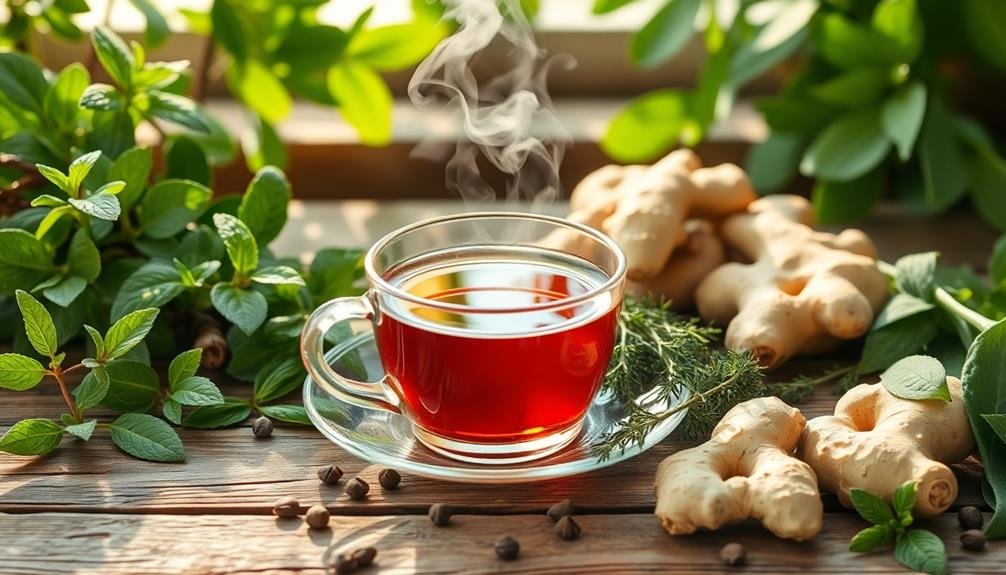

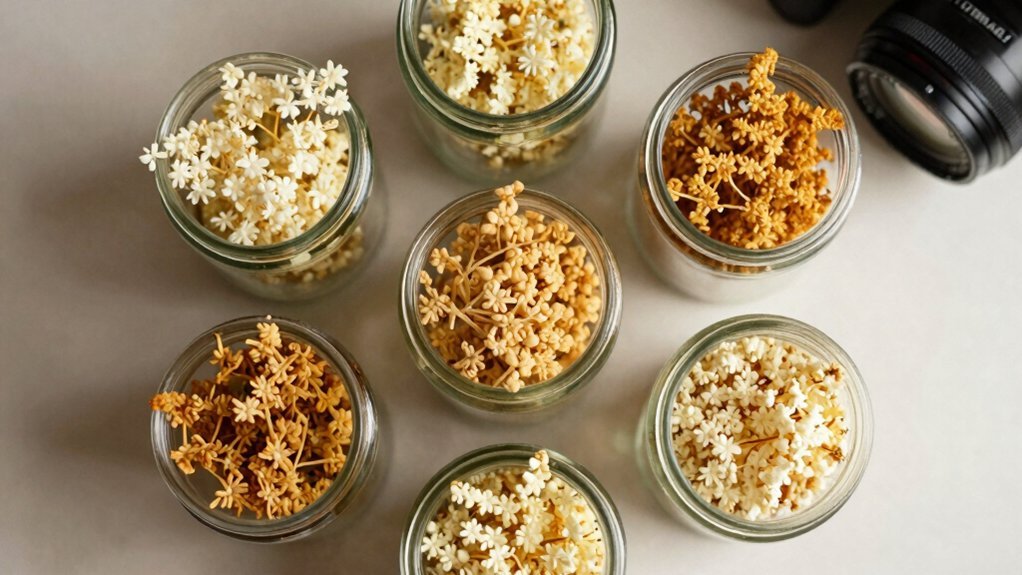

Leave a Reply